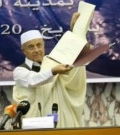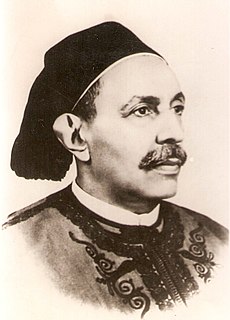
The Politics of Libya is in an uncertain state due to the collapse of the Libyan Arab Jamahiriya in 2011 and an ongoing civil war between the Council of Deputies in Tobruk and its supporters, the New General National Congress in Tripoli and its supporters, and various jihadists and tribal elements controlling parts of the country.

Muammar Mohammed Abu Minyar Gaddafi, commonly known as Colonel Gaddafi, was a Libyan revolutionary, politician, and political theorist. He governed Libya as Revolutionary Chairman of the Libyan Arab Republic from 1969 to 1977, and then as the "Brotherly Leader" of the Great Socialist People's Libyan Arab Jamahiriya from 1977 to 2011. He was initially ideologically committed to Arab nationalism and Arab socialism but later ruled according to his own Third International Theory.
Nonpartisan democracy is a system of representative government or organization such that universal and periodic elections take place without reference to political parties. Sometimes electioneering and even speaking about candidates may be discouraged, so as not to prejudice others' decisions or create a contentious atmosphere.

Misrata, is a city in the Misrata District in northwestern Libya, situated 187 km (116 mi) to the east of Tripoli and 825 km (513 mi) west of Benghazi on the Mediterranean coast near Cape Misrata. With a population of about 281,000, it is the third-largest city in Libya, after Tripoli and Benghazi. It is the capital city of the Misrata District and has been called the trade capital of Libya. The harbor is at Qasr Ahmad.

On 7 July 2012, the National Transitional Council, in power since the Libyan Civil War, supervised democratic elections for a 200-member General National Congress to replace the Council. The assembly was to choose a prime minister and organize parliamentary elections in 2013. A process to write a constitution was also to be determined. Unrest driven by armed militias, ethnic minority and radical groups undermined the process and the government for the years following the overthrowing of Muammar Gaddafi. While internal apathy towards democratic reforms slowed the process, external bodies such as the European Union were still pressing for the establishment of a national dialogue to build consensus for the drafting of a new constitution to take place before the end of 2014. Parliamentary elections were scheduled to be held on 25 June 2014 in a move aimed at stabilizing the country and quelling the unrest.

The Federation of Arab Republics was an attempt by Muammar Gaddafi to merge Libya, Egypt and Syria in order to create a United Arab state. Although approved by a referendum in each country on 1 September 1971, the three countries disagreed on the specific terms of the merger. The federation lasted from 1 January 1972 to 19 November 1977.

General elections were held in Libya on 19 February 1952, except in three constituencies in Tripolitania, where the elections were delayed until March after rioters destroyed the electoral register on election day. They were the first elections in the country's history.

General elections were held in Libya on 7 January 1956.

General elections were held in Libya on 10 October 1964. Following the 1952 elections political parties had been banned, so all candidates contested the election as independents. Although its spokesmen were arrested, the opposition managed to obtain representation in parliament. As a result, King Idris dissolved the Assembly and early elections were held the following year.

General elections were held in Libya on 17 January 1960.
The 1942 Mid-Canterbury by-election was a by-election held on 27 January 1942 during the 26th New Zealand Parliament in the seat of Mid-Canterbury. The by-election resulted from the death of Arthur Grigg; his wife Mary Grigg was elected unopposed.

The Ninth constituency for French residents overseas is one of eleven constituencies each electing one representative of French citizens overseas to the French National Assembly.

Parliamentary elections were held in Libya on 25 June 2014 for the House of Representatives. Whilst all candidates ran as independents, the elections saw nationalist and liberal factions win the majority of seats, with Islamist groups being reduced to only around 30 seats. Election turnout was very low at 18%.

The Constitutional Declaration is the current supreme law of Libya, introduced due to the overthrow of the Gaddafi government in the Libyan Civil War. It was finalised on 3 August 2011 by the National Transitional Council, and is intended to remain in effect until a permanent constitution is written and ratified in a referendum. The document was publicly announced at a press conference of 10 August by Abdul Hafiz Ghoga, Vice President and official spokesman of the NTC.

Elections for a General National Congress (GNC) were held in Libya on 7 July 2012, having been postponed from 19 June. Once elected, the General National Congress was to appoint a Prime Minister and Cabinet. The GNC was originally to be charged with appointing a Constituent Assembly to draw up Libya's new constitution, but the National Transitional Council (NTC) announced on 5 July that the Assembly would instead be directly elected at a later date.

Constitutional Assembly elections took place in Libya on 20 February 2014. Nominations for elections to the constituent assembly started on 6 October 2013; registration for candidates to the assembly was over as of 11 November 2013. The assembly will be composed of 20 members each from Libya's three regions: Tripolitania, Cyrenaica and Fezzan. The work of the committee is expected to last from March 2014 until July 2014. The constitutional declaration submitted in August 2011 by the formerly ruling National Transitional Council indicated that Congress itself would appoint the commission; however the General National Congress (GNC) voted instead to hold an election for the selection of individuals to the constitutional commission. The constitutional commission will draw up the constitution, which will then be up for vote in a referendum. As of early January 2014, 1,001,910 voters had registered via SMS.

Nouri Abusahmain is a Libyan politician. He is a major figure on the Islamist side of the 2014 Libyan Conflict and founder of the LROR group which is considered "terrorist" by the internationally recognized Libyan parliament. He is reported to have rigged proceedings of the General National Congress while serving as its president.

Local elections were held in several municipalities in Libya during 2012.

The House of Representatives (HoR) is a legislature of Libya. As part of the ongoing Libyan Civil War, it represents the "Tobruk government" based in the east of the country.









